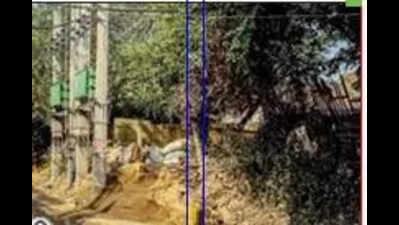- News
- City News
- gurgaon News
- Nuh leads with 2.2k waqf properties in Haryana; state total exceeds 12.5k
Trending
Nuh leads with 2.2k waqf properties in Haryana; state total exceeds 12.5k
Gurgaon: There are 12,524 Waqf properties in Haryana, and collectively, they span over 20,855 acres of area, govt data shows. Two-thirds (8,207) of these properties are in rural areas, and the remaining, in urban areas.
Among districts, Nuh – which has a majority Muslim population – has the highest concentration of Waqf properties, at 2,218, followed by Ambala (1,080) and Kurukshetra (985). Panipat has 972 such properties, and Hisar, 904.
Some of Haryana's most urbanised and industrialised districts, including Gurgaon, rank lower on the list. There are 246 registered Waqf properties in Gurgaon, and 253 in Rewari. Faridabad and Palwal together account for 557 properties. Panchkula has the lowest number of properties under Waqf, at 104.
Properties under Waqf are under focus as the central govt on Wednesday tabled the contentious Waqf (Amendment) Bill in Lok Sabha for discussion and passage. According to the govt, the bill aims to address issues and challenges in regulating and efficiently managing Waqf properties.
In India, central and state Waqf Boards are the third largest owners of land, after the armed forces and Railways. Govt data says the boards control 8.7 lakh properties covering 9.4 lakh acres of area in the country.
Key amendments proposed by the joint parliamentary committee include giving the central govt powers to make rules on registration of properties under Waqf and carry out audits of their accounts.
The amendment also brings back an earlier norm that said Muslims who have been practising for at least five years can dedicate properties to Waqf. Other key changes are inclusion of two non-Muslim members in the boards and leaving properties for women in the family to inherit before any dedication to Waqf.
Opposition parties have vehemently opposed the bill, alleging that the changes are "unconstitutional" and target the minority community.
Chaudhary Zakir Hussain, former Congress and INLD MLA and administrator of the Haryana Waqf Board, said these properties include agricultural lands and other urban lands/shops attached to graveyards, mosques, khanqahs, shrines, and takias.
"These properties were mainly identified during the survey of 1963-1969 and duly notified in the Gazette of India. These also include those identified and registered by the board," said Hussain, who now holds charge as vice-president of BJP's Minority Morcha.
He said the Haryana Waqf Board was established by the state govt on Aug 1, 2003. Before that, Haryana was a constituent unit of the Punjab Waqf Board.
Hussain said the board has set up schools and colleges, including the Mewat Engineering College (Waqf) in Palla village of Nuh. It gives financial aid to schools, madrasas, colleges and vocational centres, apart from scholarships to promising students.
"The board generates its revenue from Waqf properties and has so far been able to pull on without any budgetary support from the govt," he said.
End of Article
FOLLOW US ON SOCIAL MEDIA









